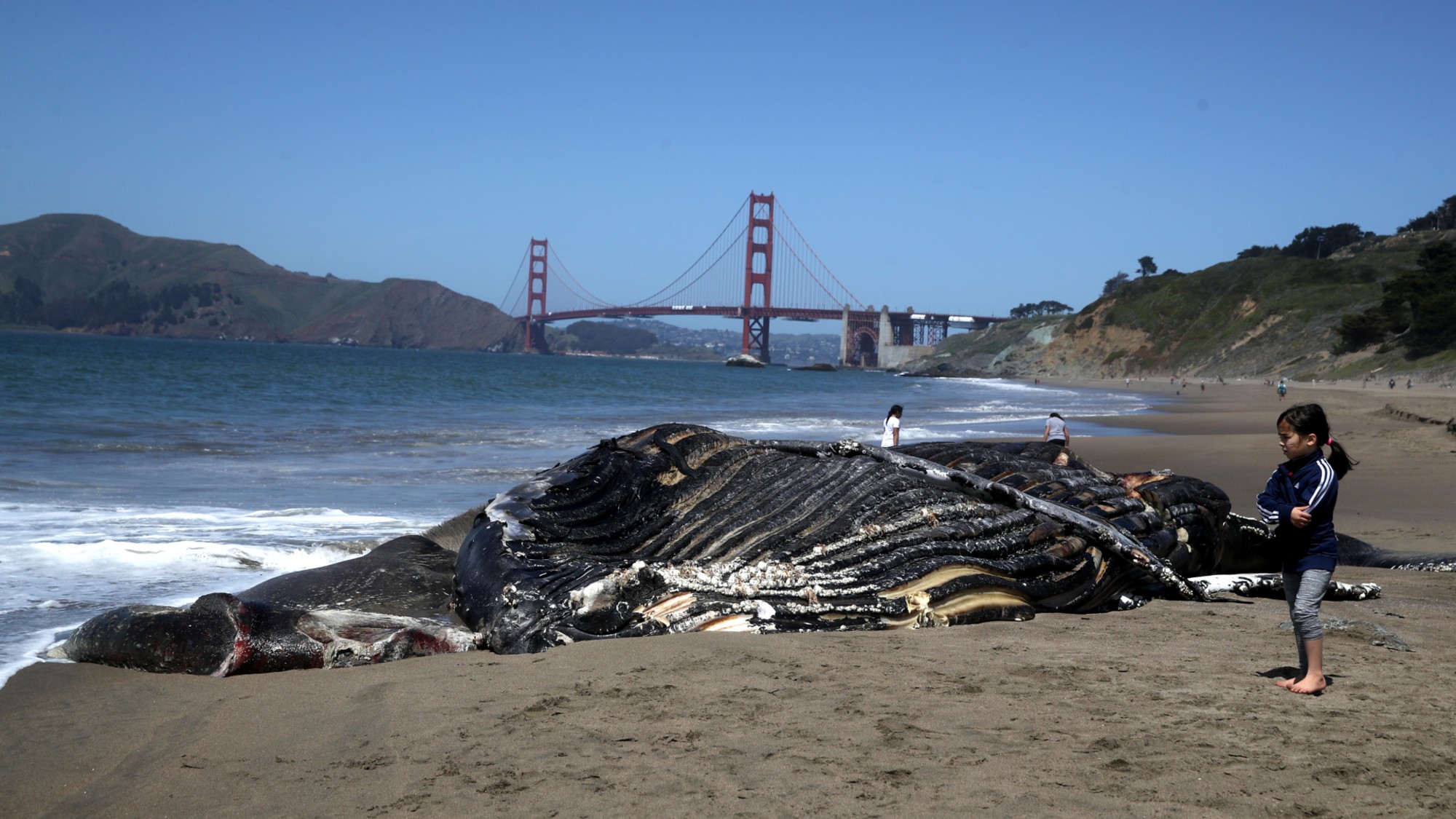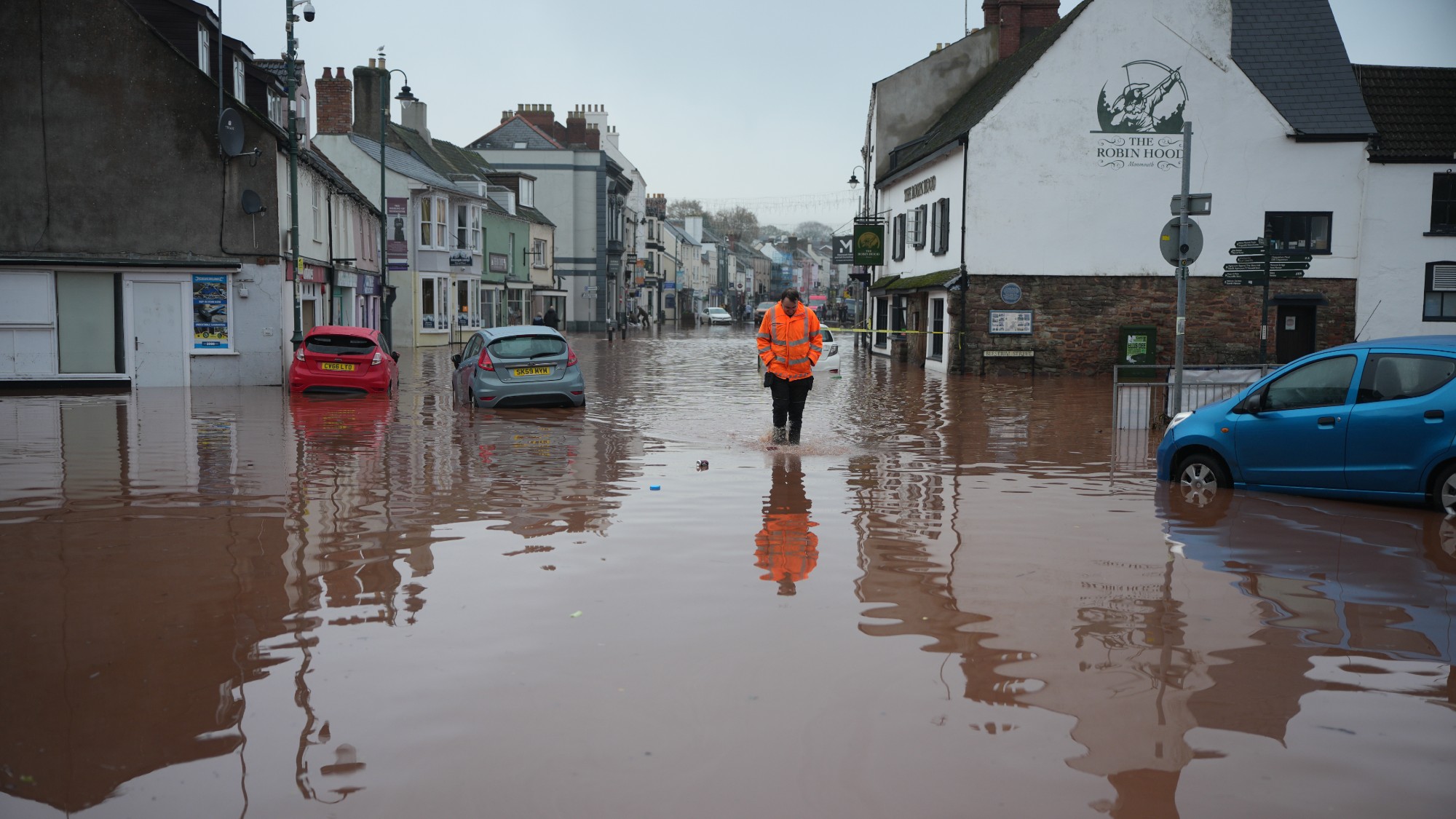Spiking whale deaths in San Francisco have marine biologists worried
Whale deaths in the city's bay are at their highest levels in 25 years


A free daily email with the biggest news stories of the day – and the best features from TheWeek.com
You are now subscribed
Your newsletter sign-up was successful
Marine biologists are sounding warning bells over an alarming trend in the San Francisco Bay Area: Whales are dying at an unprecedented level in the city's waters. While whales have always died in the San Francisco Bay Area, the number of deaths has reached a fever point, with 2025 already seeing more dead whales than any year in the past quarter century. And scientists are concerned about what this could mean for both the mammals and San Francisco's marine biome.
'Unusually high number'
At least 24 dead whales have been discovered in the waters near San Francisco this year, according to the California Academy of Sciences. This is the highest number of dead whales seen in the San Francisco Bay Area since 2000. One notable incident occurred this past May when five whales were "found dead in just one week," said CBS News.
The dead whales come from a variety of species. The majority of them, 21, have been gray whales, though two baleen whales and one minke whale have also died. This is a significantly higher total of whale deaths at this time in 2024 than the last few years, compared to 14 that died in 2019 and 15 in 2021.
The Week
Escape your echo chamber. Get the facts behind the news, plus analysis from multiple perspectives.

Sign up for The Week's Free Newsletters
From our morning news briefing to a weekly Good News Newsletter, get the best of The Week delivered directly to your inbox.
From our morning news briefing to a weekly Good News Newsletter, get the best of The Week delivered directly to your inbox.
There has also been an "unusually high number" of whale sightings this year in the Bay Area, with "more than 30 individual gray whales confirmed via photo identification," said the California Academy of Sciences. In comparison, only "six gray whales were sighted in the bay" in all of 2024.
'If you see a blow, go slow'
Many of these whales have been killed by boat strikes as the whales were migrating, scientists say. Grey whales in particular migrate through the region to reach Arctic feeding waters. 2024's increase in migrating whales suggests the whales are becoming more prevalent and therefore harder for boaters to avoid. This often leads to collisions with vessels. Gray whales have a "very low profile in the water that can make them difficult to sight, unlike other coastal whales like humpback whales," said the California Academy of Sciences.
Scientists have cautioned that it is "vital that all boaters, from large commercial vessels to sailboats, be whale-aware. If you see a blow, go slow," said Kathi George, the director of cetacean conservation biology at the Marine Mammal Center, in a statement. But while at least "eight of the gray whales were probably killed by vessel strikes," the "cause of death for the others was uncertain," said The Independent.
Many are concerned that continued whale deaths could lead to heightened problems for scientists, who attempt to use the whale to study food supply levels and ocean climate trends. There are "signs of concern for this population as it moves forward into the future," George said to ABC News. What scientists are "trying to learn is: We know that climate change is changing ocean conditions and changing prey availability for these whales in the Arctic," and the Bay Area is a "puzzle piece" to this migration. For now, people in San Francisco who spot whales can report them through a special app called Whale Alert or on the Marine Mammal Center's website.
A free daily email with the biggest news stories of the day – and the best features from TheWeek.com
Justin Klawans has worked as a staff writer at The Week since 2022. He began his career covering local news before joining Newsweek as a breaking news reporter, where he wrote about politics, national and global affairs, business, crime, sports, film, television and other news. Justin has also freelanced for outlets including Collider and United Press International.
-
 The ‘ravenous’ demand for Cornish minerals
The ‘ravenous’ demand for Cornish mineralsUnder the Radar Growing need for critical minerals to power tech has intensified ‘appetite’ for lithium, which could be a ‘huge boon’ for local economy
-
 Why are election experts taking Trump’s midterm threats seriously?
Why are election experts taking Trump’s midterm threats seriously?IN THE SPOTLIGHT As the president muses about polling place deployments and a centralized electoral system aimed at one-party control, lawmakers are taking this administration at its word
-
 ‘Restaurateurs have become millionaires’
‘Restaurateurs have become millionaires’Instant Opinion Opinion, comment and editorials of the day
-
 Earth is rapidly approaching a ‘hothouse’ trajectory of warming
Earth is rapidly approaching a ‘hothouse’ trajectory of warmingThe explainer It may become impossible to fix
-
 At least 8 dead in California’s deadliest avalanche
At least 8 dead in California’s deadliest avalancheSpeed Read The avalanche near Lake Tahoe was the deadliest in modern California history and the worst in the US since 1981
-
 The environmental cost of GLP-1s
The environmental cost of GLP-1sThe explainer Producing the drugs is a dirty process
-
 Climate change could lead to a reptile ‘sexpocalypse’
Climate change could lead to a reptile ‘sexpocalypse’Under the radar The gender gap has hit the animal kingdom
-
 Why scientists want to create self-fertilizing crops
Why scientists want to create self-fertilizing cropsUnder the radar Nutrients without the negatives
-
 How drones detected a deadly threat to Arctic whales
How drones detected a deadly threat to Arctic whalesUnder the radar Monitoring the sea in the air
-
 ‘Jumping genes’: how polar bears are rewiring their DNA to survive the warming Arctic
‘Jumping genes’: how polar bears are rewiring their DNA to survive the warming ArcticUnder the radar The species is adapting to warmer temperatures
-
 How will climate change affect the UK?
How will climate change affect the UK?The Explainer Met Office projections show the UK getting substantially warmer and wetter – with more extreme weather events
